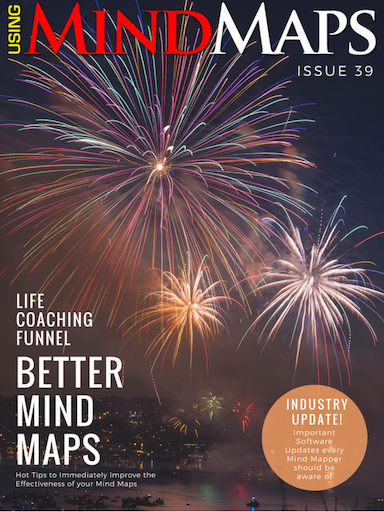Using Mind Maps Magazine Issue 39

Excerpts From the Latest Issue:
Editor’s Note
By Faizel Mohidin
There is always room for improvement, whether you’re a novice, or an experienced Mind Mapper.
This month we include some articles on improving the effectiveness of your Mind Maps in different situations. Even one good tip could perhaps make a big difference to your effectiveness.
There has been quite a bit of movement in the Mind Map Software Industry; and this month, Mind Mapping Software Expert, Chuck Frey, of the Mind Mapping Software Blog, gives some industry updates and movements, which are quite interesting.
There have been some takeovers and acquisitions. So, you may have been wondering what will be happening, if your favourite software, is among them. Chuck has some inside information to put you at ease.
The novice guide to taking meeting notes with Mind Maps
From the iMindQ Blog
For a long time, just like everyone else, I would take meeting notes with a piece of paper and a pen. As the meeting progressed, I’d note down quotes from others, promises on my behalf and anything that struck me as being important.
This presented two problems each and every time I did it:
- Meetings aren’t linear. They skip about all over the place with previous discussions referred to further down the line and topics that were previously on the agenda making regular appearances.
- My notes never made sense afterwards. Sometimes, it would be a month or two before I needed to refer back to the notes and, when I did, they were completely unfathomable...
Subscribe to Using Mind Maps
Get Access to the Best Mind Mapping Tips, Tools, Techniques Resources and Opinions.
Take More Effective Notes Using Mind Maps
By MindMeister
As professionals in the 21st century, we consume tons of information in various formats on a daily basis. We read books and articles, attend lectures, watch TED talks and documentaries, take e-learning courses and subscribe to specialized magazines. Sure, some of these things we simply do for pleasure, but often times, the purpose of these activities is to actively expand our knowledge, become better at our job, or grow as a person. In those cases, passively watching a video or simply reading a text is simply not enough...
6 ways you can immediately double the effectiveness of your mind maps
By Chuck Frey
There’s no question that mind mapping software is an incredibly powerful tool. But like most tools, it’s only as good as the skill and mindset of the person using it. Here are six practices you can start using now to dramatically improve the effectiveness of your mind maps...
Self-Efficacy: Why Believing in Yourself is Important
By Tarek Fahmy
Psychologist Albert Bandura regarded as the greatest living psychologist, coined the term self-efficacy. (born 1925 - Professor Emeritus of Social Science in Psychology at Stanford University) has defined self-efficacy as: one's belief in one's ability to succeed in specific situations or accomplish a task.
Self-efficacy helps provide lot of explanation on why people feel the way they do and how they perceive the world and engage with it.
Your sense of self-efficacy can play a major role in how you approach challenges.
How to Use The Life Coaching Funnel to Achieve a Goal
By Adam Sicinski
Life Coaching is about asking an optimal set of questions that can help your client gain the clarity they need to overcome a challenge, solve a problem or achieve a desired goal. Along the way life coaches use a variety of questioning methods and tools that help challenge how their client thinks about their life and circumstances in optimal and helpful ways. One of these tools is known as the Life Coaching Funnel.
Mind Map Showcase: 22 Low/No Cost Things You Can Do to Help a Person with Dementia
By Biggerplate
This week we're looking at a wonderful and important mind map, shared on Biggerplate, detailing 22 things you can do to help a person with dementia. This mind map was created and shared by Dr. George Huba - an expert in the field of cognitive decline, memory loss and dementia...
And More...
Want to read More?
Click the applicable link below:
[Click Here to get it on iOS >>]
[Click Here to get it on Android >>]
Your Feedback
The first phase was to set up a scalable infrastructure that could deliver a well formatted interactive digital magazine seamlessly and easily to you.
The next phase is to find out what you would like to see, or what your problems are so that you are always getting relevant content.
Some of the best Mind Mapping Minds and Software vendors are featured in the magazine. So, if I don’t have an answer, I’m sure one of them will.
So, email me right now with what you would like to see in the Mag. I’ll be waiting...
